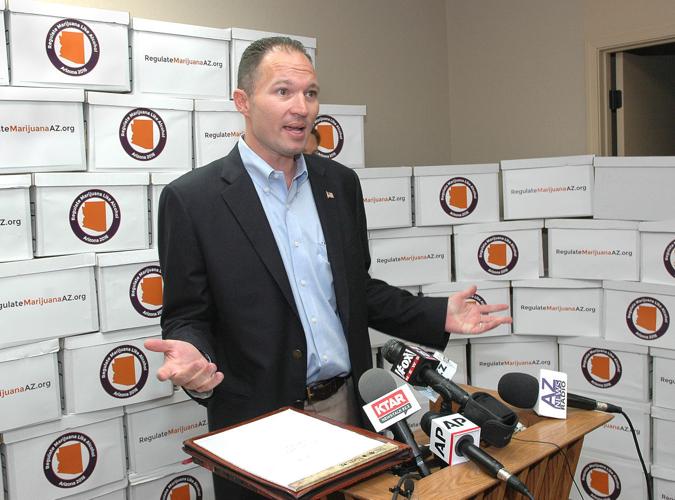You know those people you see on street corners and outside libraries asking you to sign a stack of petitions?
They are a sought-after, fought-over commodity.
Whether an initiative campaign can get access to those petition circulators may determine, in today’s Arizona politics, whether voters get to consider that initiative on their ballot at all.
The latest example of this emerged Wednesday, when a group attempting to strengthen Arizona’s Clean Elections system gave up on its effort to put the issue on the ballot. The ultimate reason, spokeswoman Julie Erfle said, was that Arizonans for Clean and Accountable Elections was outmaneuvered in its effort to negotiate a deal with a signature-gathering company.
“There’s not a huge pool of paid gatherers to pull from,” she said. “What it meant was we needed to look out of state to bring in a paid signature firm. We did, but it definitely delayed things significantly.”
Other factors were at play in this case. Given more time, the group could have contracted with another firm. And Democrats, who were the most natural constituency for the initiative, were not united behind the initiative.
Nevertheless, interest groups are using various ways to monopolize the readily available firms and keep their competitors from getting the 150,000 signatures necessary to put an initiative on the ballot. For example, when this Clean Elections group filed to pursue the initiative, another group popped up to do the opposite.
Opposing groups can contract with the available signature-gatherers and demand through a non-compete clause that the individual signature-gatherers not carry both pro- and anti-clean elections petitions. Something similar happened when the solar industry pursued an initiative this spring.
In this case, the opposition was led by the Arizona Chamber of Commerce and Industry. The chamber has not copped to tying up the signature firm, Sign Here Petitions, that Arizonans for Clean and Accountable Elections was negotiating with.
But chamber spokesman Garrick Taylor wouldn’t deny it either. He simply pointed out that you need financial backers and time to get an initiative on the ballot. The marijuana initiative, which the chamber opposes, had time and money and filed about 220,000 signatures Thursday, Taylor pointed out.
“When you hire these firms, it’s not a handshake deal,” he said. “These are financial transactions. You have to attract backers, funders, to do this work.”
Then there’s an entirely different approach, which state Rep. Ken Clark, D-Phoenix, is taking in an effort to overturn a new Arizona law that eliminated state regulations of “dark money.” His anti-SB 1516 effort is using volunteers to gather the 75,000 signatures needed to put the overturn of this recently passed bill on the ballot.
“We’re an all-volunteer effort. We don’t have the big money,” Clark said. “The nice thing about that is that the dark money people have not dissuaded people from gathering our signatures.”
The efforts to squelch signature-gathering campaigns and SB 1516, which Clark is trying to overturn, have something in common, he pointed out: Both benefit wealthy interests trying to dominate state politics.
When monied interest groups interfere with signature-gathering efforts, that “subverts the process outlined in our constitution to get things on the ballot,” Clark said.
And if this anti-dark-money referendum doesn’t get on the ballot and pass, he pointed out, elected officials will constantly be under the threat that they’ll be attacked by dark-money groups if they don’t toe the line.
Suddenly those petitions feel a lot more important.
Lopez forgets a deal
It’s been years since Humberto Lopez failed in his effort to strike a deal with the Tucson City Council for the redevelopment of his Hotel Arizona on West Congress Street. It’s been four years since he closed the hotel in April 2012, leaving an eyesore on the entryway to downtown.
But the intervening years haven’t been so bad for Lopez. First, he and his good-cop nephew, Omar Mireles, engineered the purchase of the Hilton El Conquistador and — crucially — the sale of its golf courses to the town of Oro Valley.
And this week, my colleague Gabriela Rico reported that Lopez and David Mehl are purchasing the Ritz-Carlton, Dove Mountain resort in Marana. Nice for them.
Yet even as Lopez wheels and deals at the upper echelons of finance, the Hotel Arizona continues to languish and deteriorate. The question that naturally arises is, if he can do all these other big-money deals, why can’t he do something about the downtown hotel?
Here’s a suggestion: Forget about the hurt feelings and bad memories and sell the place. Wash your hands of it and let someone else try to figure out how to make it work.
Judge judged unworthy
Once again a review panel has found a Pima County Superior Court judge does not meet judicial standards.
The Arizona Commission on Judicial Performance Review, led by Tucsonan Mike Hellon, voted 27-4 against Judge Carmine Cornelio. The judge was reprimanded in 2007, 2010 and 2013 for rough treatment of co-workers or parties to cases before him.
It’s the second straight period of judicial-retention elections in which a Pima County judge had been found below standard. In 2014, Pima County Superior Court Judge Catherine Woods was found below standards by the review panel, but was retained by voters.
Pima County voters will decide whether to keep Cornelio as a judge during the Nov. 8 general election.






